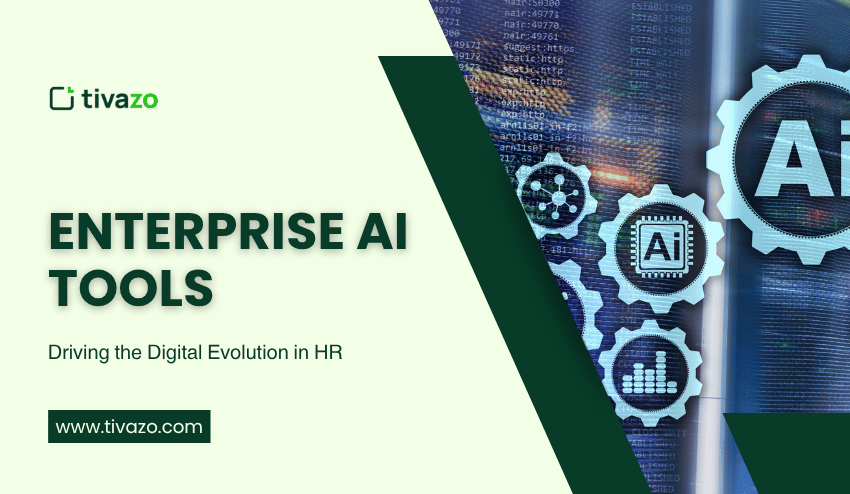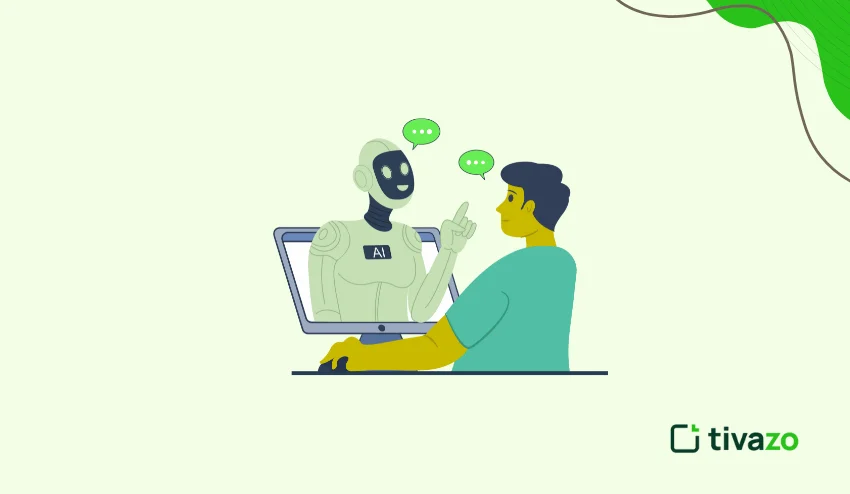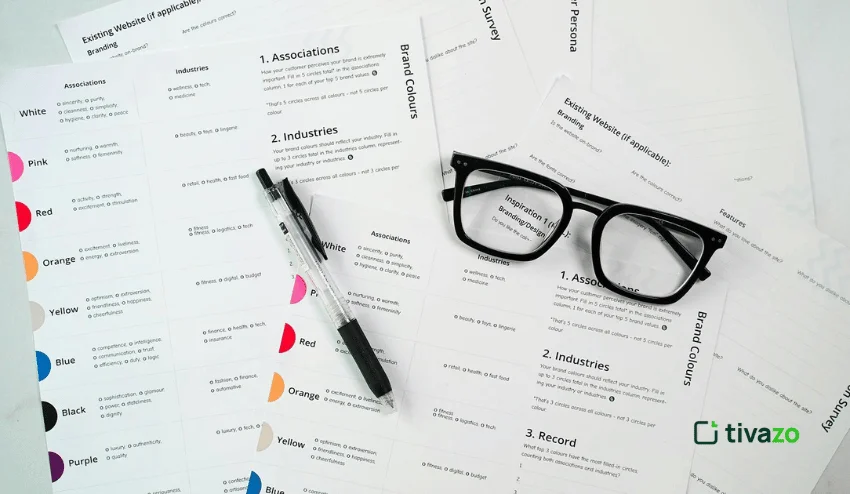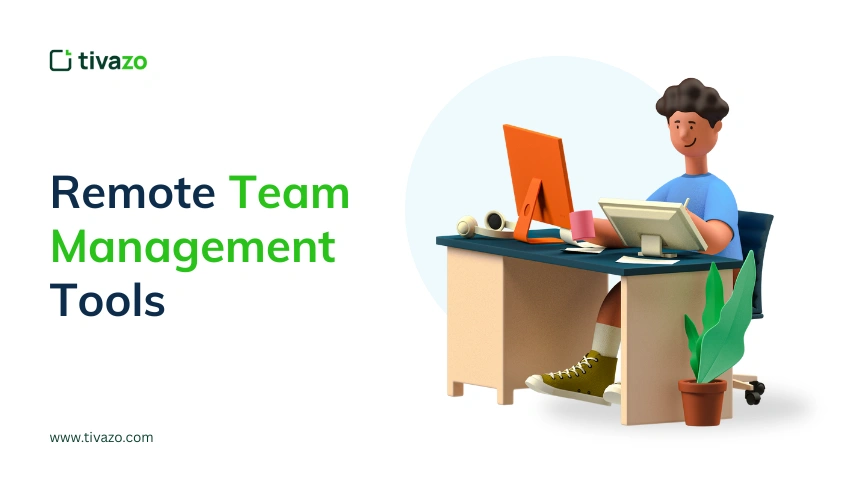Digital Evolution in the Human Resources sector is undergoing a revolution in the digital age. As sectors change quicker than ever, working models are changing, employee expectations are shifting, and the need for HR to be more strategic, smart and agile is becoming increasingly apparent, and here is where AI and automation have emerged, to take us forward. AI is allowing better change management in organizations and enabling HR to facilitate efficiency and productivity in ways never seen before, from time management and employee engagement, moving HR out of supporting functions into strategic ones. Here we will discuss exactly how to do this and highlight some key technologies enabling us to act.
Streamlining time and productivity management
Tracking employee time usage has always been a significant challenge for HR teams. Many organizations primarily rely upon punchcard-like models or spreadsheets to track working hours, both of which are certainly inefficient and cause false confusion and loss of time that no organization can afford to waste.
The failure to effectively track and manage employee time is compounded with scaling organizations and particularly hybrid or remote working teams, and this is exactly why enterprises are increasingly turning to intelligent, automatic time tracking software.
The rise of intelligent time tracking significantly enhances how HR departments can monitor and manage time usage. An intelligent time tracking platform like Tivazo can automate time-wasting tasks like calculations, logging and generation of reports and compliance documents. It makes it a whole lot simpler to accurately track hours for distributed teams who may be working in multiple time zones.
Furthermore, these platforms leverage real time data analysis and reporting to identify patterns where valuable improvement could occur. With this, HR teams can not just track time spent on the job, but also projects/tasks with those hours. By reducing friction and gaining improved visibility, AI time tracking tools will make it possible for the organization to gain insights into inefficiencies, then act on those insights to increase productive time.
5 Powerful Ways AI is Driving the Digital Evolution in HR
As companies move toward digital evolution, AI tools are key in changing Human Resources. From improving time management to supporting workforce planning, here are five powerful ways AI is changing HR:
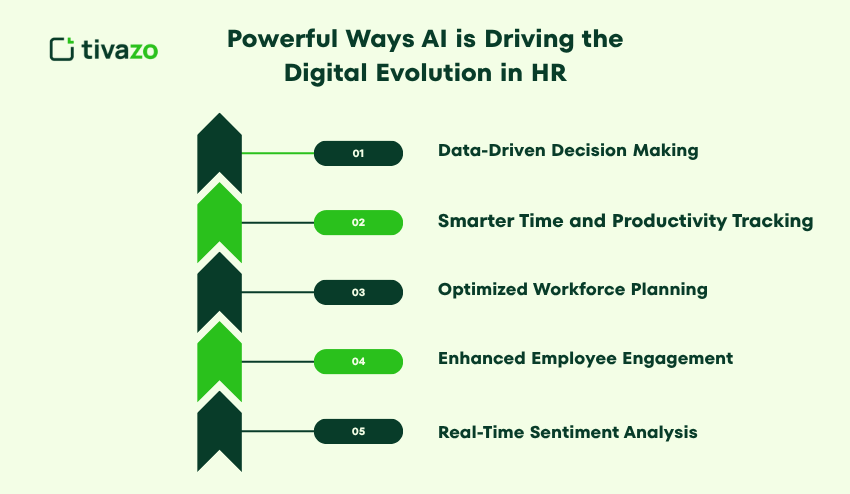
1. Data-Driven Decision Making
AI enterprise analytics provides HR teams with an analysis of large data sets, providing an understanding of significant findings regarding employee performance, retention, and development opportunities. All of these insights support HR teams in making informed decisions based on data-driven approaches for managing their workforce and enhancing employee satisfaction.
2. Smarter Time and Productivity Tracking
AI-based automated time management tools can be used by HR departments to streamline tasks such as scheduling, tracking employee hours worked and generating advanced reporting in real time. This level of automation can significantly decrease errors due to manual data entry and can identify underlying trends that can advance productivity and inform decision-making across the organization.
3. Optimized Workforce Planning
AI can assess historical data and ensure the right workforce metrics while enabling workforce planning by projecting talent needs across the organization, identifying skill gaps, and recruiting and deploying workforce resources more efficiently. By integrating AI within existing HR systems, organizations can improve workforce planning and recruiting to deploy the right employee in the right position at the right time.
4. Enhanced Employee Engagement
AI promotes the employee experience by providing self-service HR portals that help answer common HR questions quickly and efficiently. This can improve morale, employee engagement and interaction while enabling HR teams to engage with strategy and other non-operational HR work.
5. Real-Time Sentiment Analysis
AI tools can easily analyze employee feedback and performance data to determine sentiment in the workplace. This information allows HR departments to take action that can impact the overall satisfaction and engagement of employees, resulting in a productive work environment.
Empowering insightful workforce planning
Workforce planning is also an important function that is difficult to manage. HR departments need to understand how to accommodate staffing and skills they require while ensuring that workloads are balanced, engaging in succession planning, and staying mindful of budget constraints. All of those factors can make workforce planning complex at times, but AI provides a timely and believable solution.
More and more, companies are using AI tools to help them execute workforce planning functions as it produces more timely and intelligent decision-making. A specific example is the use of AI agents in conjunction with already functioning ERP (Enterprise Resource Planning) or HCM (Human Capital Management) systems. When you combine the two technologies, AI models can access existing employee profiles, performance, and historical data and enhance workforce planning processes. AI can enable skills matching when staffing employees. AI can transform underutilized employees into top performers and provide HR employees accurate staffing forecasts to ensure coverage.
By allowing employee data to be analyzed at a high level of speed, AI also enables HR teams to perform sentiment analysis and gain valuable information about workplace dynamics and team health. It is this information that helps HR teams aggressively plan for staggering resources to encourage cohesion.
Driving engagement with EX enhancement
Transforming HR isn’t about enabling HR teams to make their lives easier, it is about the improvement of life for employees to drive motivation and productivity. This has usually been an area that companies aim to improve through workshops, retreats, and perks. Those efforts can help create some engagement but focus is better directed toward enhancing the moment-to-moment experience of being an employee. This is another area where AI can help.
Companies have an important opportunity to leverage LLMs (Large Language Models) in tandem with their HR systems to upgrade to self-service options, similar to businesses that are deploying LLMs in retail for customer service. The traditional systems often require employees to work their way through painfully slow, inefficient processes to get answers for simple questions, like when can I take my vacation days, how do I submit a leave request, how do I access my payroll information, or a question regarding overtime. By implementing an integrated LLM, companies can launch self-service options that include chatbots, giving instantaneous answers to employee queries, thus mitigating the friction associated with HR processes. LLM evaluation tools can further help ensure these models provide accurate, reliable responses tailored to the company’s HR policies.
By implementing LLMs for self-service, the HR teams are changing the interactions with employees and providing more responsive, personalized support. In the long run, this quality-of-life change to EX (Employee Experience) results in higher levels of employee engagement, better morale and retention, and enhanced employee relations which positively contribute to overall employee performance and productivity.
Revolutionizing Employee Onboarding with AI
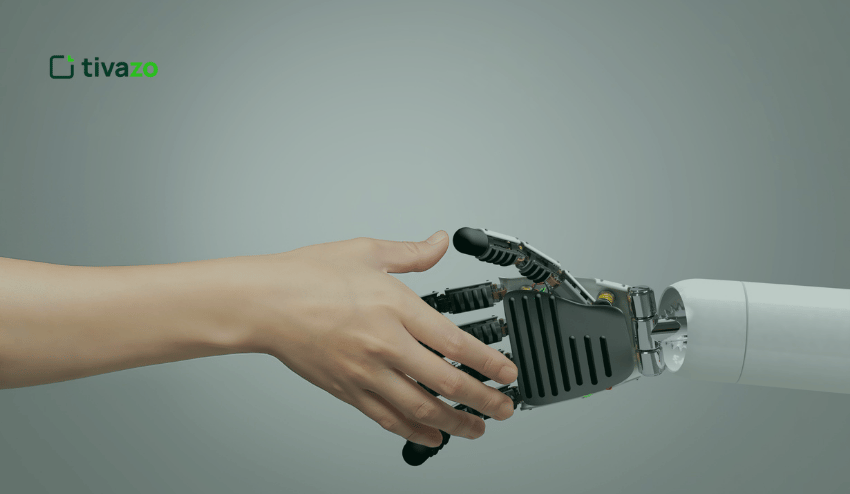
Companies are leveraging AI-powered systems from the leading AI Development Company India to change their employee onboarding process. Automated systems can help new employees complete paperwork, orientations, and training modules. AI can also help new employees identify mentors and facilitate feedback, improving the onboarding experience and increasing speed to productivity.
Furthermore, AI can customize the onboarding journey for each employee based on their role, experience, or preferences. By incorporating information such as job experience, learning style, and performance indicators, AI can deliver customized training modules and resources to new hire employees, allowing them to be more relevant, effective, and organized. The extent of customization can help improve new employees’ sense of support, engagement, and readiness to contribute from day one.
The Future of HR: AI-Powered Automation and Continuous Improvement
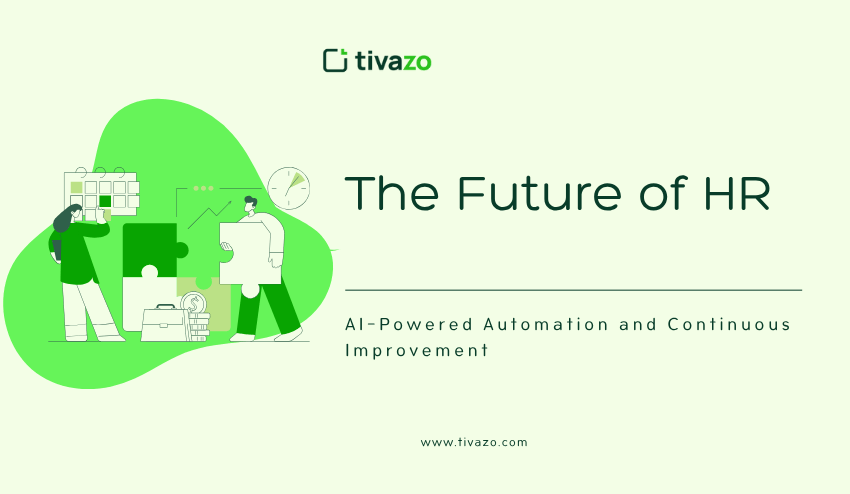
The advancement of HR will largely be determined by automated processes that use AI, as organizations strive to improve their HR systems continually. As AI products expand in capabilities, HR teams will find more ways to improve the decision-making process, anticipate employees’ needs and assess the workforce for greater efficiencies and improved satisfaction.
The growing role of AI will transform HR processes from not just faster functions but smarter functions. More automation will take HR teams out of mundane tasks, such as payroll functions, benefits, and risk/compliance–all time-intensive, manual workflows. Allowing more AI to handle these repetitive processes allows HR professionals to concentrate on meaningful initiative strategies, such as employee talent growth and organizational development.
The predictive capabilities of AI will enable HR teams to anticipate trends in the workforce. AI can predict future workforce needs with surprising accuracy–from potential gaps in competencies/capabilities to high turnover rates from an analysis of employee data. Proactively implementing solutions before problems arise will save costs in the long run, as well as meet future needs to retain employees.
Moreover, continuous improvement facilitated by AI has the capacity to continually learn and evolve. As AI systems gather and analyze data, they will strengthen their predictions and/or recommendations, enabling ongoing optimization in human resources (HR) practice. This will with result in a more agile, data-driven function of HR that can adapt to the fast-changing business context.
Summing up
While maintaining a people-centric approach is as critical as ever has been, the realities of today’s business landscape dictate that for HR to be truly successful at the enterprise level, the approach must be tech-driven. By streamlining time management, empowering smart workforce planning, and facilitating a frictionless and satisfying employee experience, AI and automation tools can enable HR to create environments that better support, engage, and empower the workers who drive their success.
